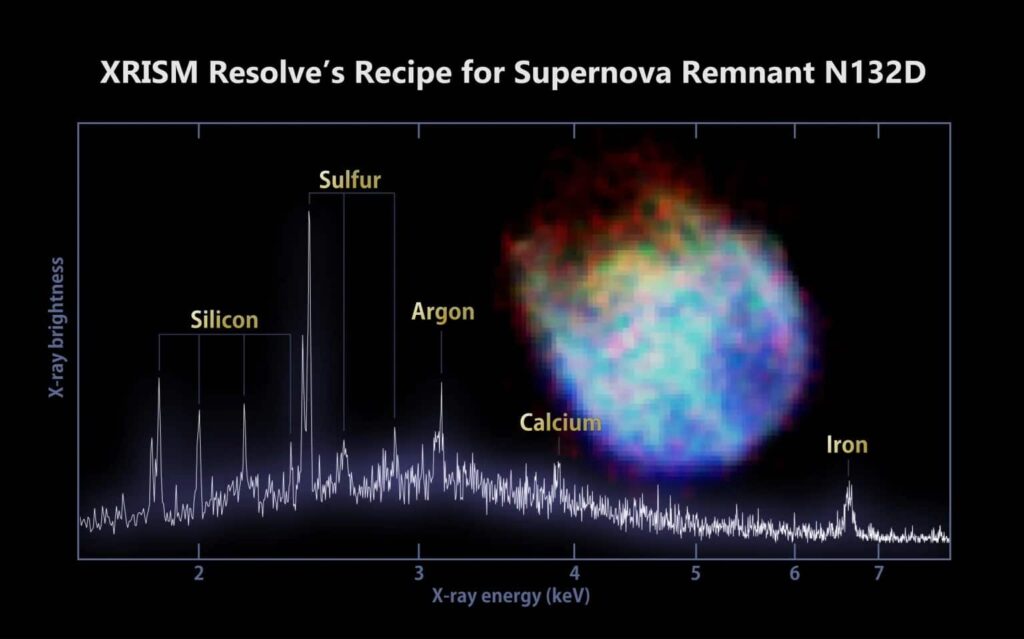A new glimpse of the hidden X-ray sky. NASA and JAXA (Japanese Aerospace Exploration Agency) are collaborating on the XRISM mission to explore celestial objects emitting X-rays. The mission aims to address significant cosmic inquiries, including the origins of the largest structures in the universe, the behavior of matter under intense gravitational forces, and the functioning of high-energy particle jets.
Recently, NASA/ JAXA XRISM Mission has released a first look at the unprecedented data it will collect. The XRISM mission team has shared a snapshot capturing a cluster of hundreds of galaxies and a spectrum revealing the chemical composition of stellar debris in a neighboring galaxy. This provides scientists with a detailed view of the chemical makeup of these celestial objects.
The XRISM mission, designed to detect X-rays with energies up to 12,000 electron volts, has two instruments: Resolve and Xtend. These instruments are positioned at the focus of an X-ray Mirror Assembly, designed and built at NASA’s Goddard Space Flight Center. XRISM aims to study the hottest regions of the universe , investigate large cosmic structures, and explore objects with intense gravitational forces.
Notably, the energy of visible light falls in the range of 2 to 3 electron volts for comparison. The XRISM mission utilized its Resolve instrument to study N132D, a supernova remnant in the Large Magellanic Cloud, a dwarf galaxy approximately 160,000 light-years away. N132D is one of the brightest X-ray sources in this region.
The detailed X-ray spectrum obtained by Resolve revealed peaks associated with elements such as silicon, sulfur, calcium, argon, and iron. This spectral analysis provides valuable insights into the composition and characteristics of the supernova remnant, showcasing the scientific potential of the XRISM mission as regular operations are set to commence later in 2024. Brian Williams, NASA’s XRISM project scientist at Goddard, said, “These elements were forged in the original star and then blasted away when it exploded as a supernova.
Resolve will allow us to see the shapes of these lines in a way never possible before, letting us determine the abundances of the various elements present and their temperatures, densities, and directions of motion at unprecedented levels of precision. From there, we can gather information about the original star and the explosion. ” XRISM’s second instrument, Xtend, is an X-ray imager developed by JAXA.
Using its Xtend instrument, the XRISM mission captured an X-ray image of Abell 2319, a galaxy cluster located approximately 770 million light-years away in the northern constellation Cygnus. Abell 2319 is the fifth brightest X-ray cluster in the sky and is experiencing a significant merger event. The X-ray image obtained by Xtend showcases the wide field of view of the instrument, providing a detailed look at the structure and dynamics of this massive galaxy cluster and contributing to our understanding of cosmic phenomena.
Lillian Reichenthal, NASA’s XRISM project manager at Goddard, said , “even before the end of the commissioning process, Resolve is already exceeding our expectations. Our goal was to achieve a spectral resolution of 7 electron volts with the instrument, but now that it’s in orbit, we’re achieving 5. What that means is we’ll get even more detailed chemical maps with each spectrum XRISM captures.
”.
From: techexplorist
URL: https://www.techexplorist.com/nasa-jaxa-xrism-released-first-look-x-ray-cosmos/79398/
